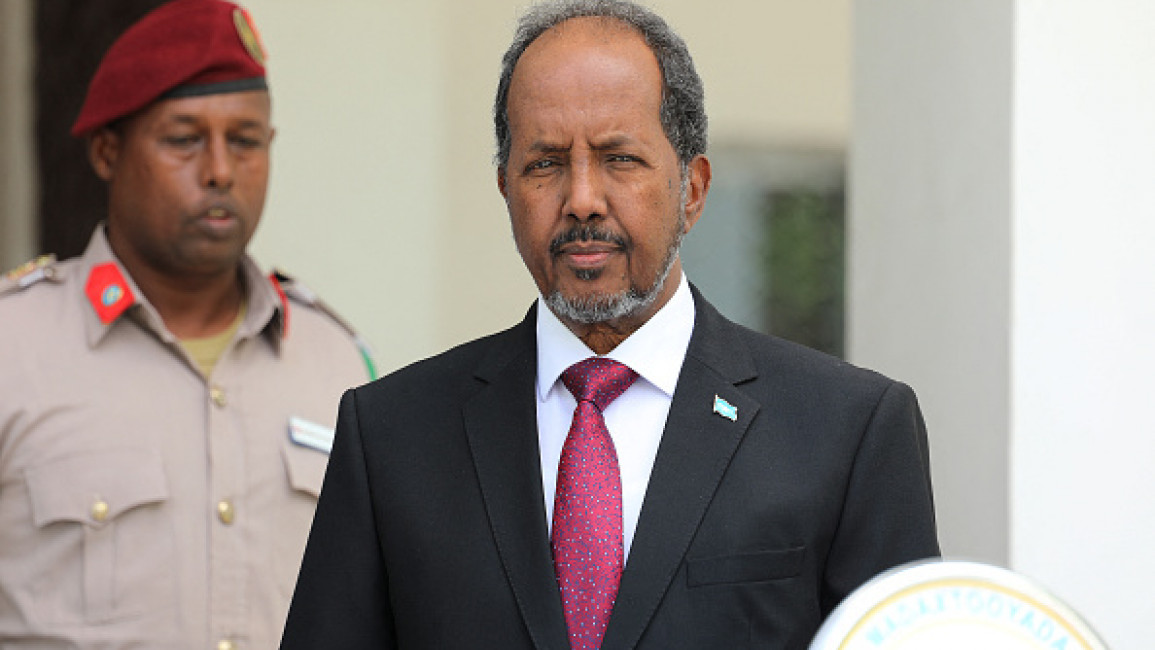Earlier this month, President Joe Biden authorised the redeployment of US troops who will help train, equip and support the Somali military's elite Danab special forces, who are fighting the Al-Shabaab.
The New Arab Staff & Agencies
30 May, 2022
30 May, 2022

Hassan Sheikh Mohamud was elected earlier this month as Somalia's new president [Getty]
Somalia's new president has applauded the return of US troops to help fight a deadly insurgency and says delivering security depends on reconciliation with other Somali leaders, after a power battle splintered the security forces into rival factions.
US President Joe Biden this month authorised the redeployment of hundreds of US soldiers who will help train, equip and support the military's elite Danab special forces fighting the Al-Qaeda-linked Al-Shabaab militants.
President Donald Trump withdrew them in December 2020, leaving them flying in and out for missions from neighbouring Kenya, a move experts described as costly and dangerous.
"We are very much grateful for President Biden to send back some of the forces, they always have been playing a role in war against Al-Shabaab," President Hassan Sheikh Mohamud told Reuters, adding that he wanted US support to continue.
Al-Shabaab has killed tens of thousands of Somalis in bombings in Mogadishu and elsewhere as it seeks to topple the government, as well as civilians in neighbouring countries in attacks on a shopping mall, hotel, university and restaurants.
Somali legislators selected Mohamud as president this month - the country has not held one-person-one-vote elections since civil war erupted in 1991.
Legislators foiled attempts by the previous president to extend his term, but the issue deeply divided security forces, who battled each other in the capital's streets.
The protracted crisis drained attention from a growing humanitarian emergency forcing more than 6 million Somalis to depend on food aid.
James Swan, the top UN official in Somalia, praised Mohamud's appointment of a prominent politician to handle the emergency, triggered by the worst drought in 40 years.
RELATEDIn-depthShafi Abtidon
Top Priority
Since Mohamud's win on May 15, official government social media accounts have pumped out images of him welcoming former political rivals and beaming Somali regional leaders, many of whom fought armed clashes with his predecessor.
"The people have to reconcile," former educator Mohamud said from a gilt chair in Villa Somalia, a government complex painted in the national colours of white and sky blue.
Mohamud's words have encouraged allies frustrated by slow progress under his predecessor, which allowed the insurgency to amass a huge warchest.
Lieutenant General Diomede Ndegeya, commander of African Union forces in Somalia, said he hoped local forces and administrations could help secure roads for AU and Somali forces to make progress against Al-Shabaab.
"It's important for us to all work together," he said.
The last major offensive against Al-Shabaab was in 2019. The insurgents still control swathes of the country but African Union peacekeeping forces are due to leave in three years.
This month, Al-Shabaab overran an AU peacekeeping base, killing dozens of soldiers. Burundi put the death toll at 10.
"Our top priority is the security," said Mohamud, although he listed other urgent matters, including building institutions and codifying election laws and government powers.
When Mohamud previously served as president, from 2012-2017, rampant corruption packed the military with ghost soldiers. Those that did exist often sold their guns when their wages were stolen.
Since then, the United Nations has set up a long-planned biometric database. Soldiers and civil servants now receive their salaries directly to their bank accounts.
Mohamud acknowledged the repeated complaints of corruption, but hailed digitalisation and said he planned to continue a financial reform package he had previously helped negotiate with the World Bank and International Monetary Fund.
"We are all for the economic reforms," he said.
Campaigners say the proof will be whether backers receive plum procurement contracts or top posts they use for kickbacks.
"We need an audit for all the taxes raised in Mogadishu, we need to pay salaries on time and we need avoid cronyism," said Mohamed Mubarak, founder of anti-corruption group Marqaati.
(Reuters)
No comments:
Post a Comment